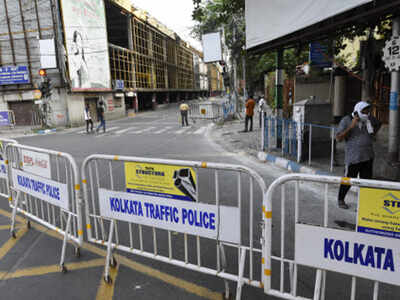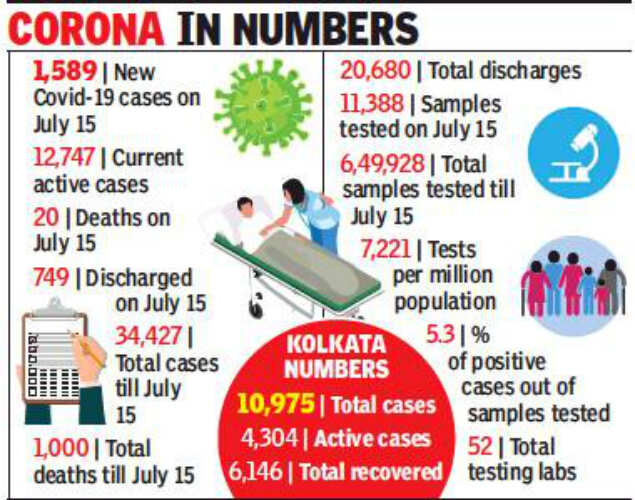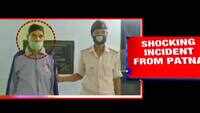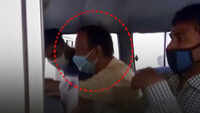
KOLKATA: The Global Advisory Board set to help Bengal to form its Covid-19 Response Policy On Wednesday — the day when the number of Covid deaths touched 1,000 in Bengal — suggested several measures to help free hospital beds to treat those at risk.

To control the spread of the disease, it is very important that the government identifies highinfection clusters and makes them local containment zones. For this to be possible, ramped up testing — using all available methods — is needed, the board said. The critical need of the moment is to deal best with the challenges raised by the rising number of infections without relying only on lockdowns, which are unsustainable over long periods of time, it added.
In a media release, the eightmember body, which has among others Nobel laureate Abhijit Banerjee, suggested that those who are not in high risk and/or have mild symptoms should be encouraged to not fill up the hospital beds. “Isolation at home is the right option for such patients as long as they have the space at home. If there is no space at home, the community centres are the right choice for such patients and we have been informed that the government has set up safe homes for that purpose. It is important to make sure that there are enough beds available at these centres,” it added.
The board also termed it tragic that families with infected members are facing ostracism, adding: “This undermines the sense of community that Bengal’s people are proud of. Moreover, it encourages people to conceal infections until it is too late to do anything about it, or to seek protection in hospitals from harassment by neighbours even when it is not medically necessary, filling up hospital beds that someone else might need.”
According to the board, “these fears are unwarranted given the systems that have been put in place and the steady improvements being made in medical treatment. We will triumph against the disease, but we need to keep our social fabric intact. The government can and should act against those who are oppressing the families of the infected.”
The Board said that NGOs are there to intervene and mediate possible conflicts. “But without the help of the community, this becomes a Herculean task. We need the youth of Bengal, for whom the disease is unlikely to be much of a risk, to take the lead here,” the board said.

To control the spread of the disease, it is very important that the government identifies highinfection clusters and makes them local containment zones. For this to be possible, ramped up testing — using all available methods — is needed, the board said. The critical need of the moment is to deal best with the challenges raised by the rising number of infections without relying only on lockdowns, which are unsustainable over long periods of time, it added.
In a media release, the eightmember body, which has among others Nobel laureate Abhijit Banerjee, suggested that those who are not in high risk and/or have mild symptoms should be encouraged to not fill up the hospital beds. “Isolation at home is the right option for such patients as long as they have the space at home. If there is no space at home, the community centres are the right choice for such patients and we have been informed that the government has set up safe homes for that purpose. It is important to make sure that there are enough beds available at these centres,” it added.
The board also termed it tragic that families with infected members are facing ostracism, adding: “This undermines the sense of community that Bengal’s people are proud of. Moreover, it encourages people to conceal infections until it is too late to do anything about it, or to seek protection in hospitals from harassment by neighbours even when it is not medically necessary, filling up hospital beds that someone else might need.”
According to the board, “these fears are unwarranted given the systems that have been put in place and the steady improvements being made in medical treatment. We will triumph against the disease, but we need to keep our social fabric intact. The government can and should act against those who are oppressing the families of the infected.”
The Board said that NGOs are there to intervene and mediate possible conflicts. “But without the help of the community, this becomes a Herculean task. We need the youth of Bengal, for whom the disease is unlikely to be much of a risk, to take the lead here,” the board said.

Coronavirus outbreak
Trending Topics
LATEST VIDEOS
City
 Minor raped in Covid-19 isolation ward of Patna Medical College and Hospital, guard held
Minor raped in Covid-19 isolation ward of Patna Medical College and Hospital, guard held  Not all pregnant women required to undergo Covid test, says Delhi government to HC
Not all pregnant women required to undergo Covid test, says Delhi government to HC  Bihar: 264 crore bridge inaugurated last month, washed away in Gopalganj
Bihar: 264 crore bridge inaugurated last month, washed away in Gopalganj  CBSE results: A few Kolkata schools buck national trend
CBSE results: A few Kolkata schools buck national trend
More from TOI
Navbharat Times
Featured Today in Travel
Get the app




